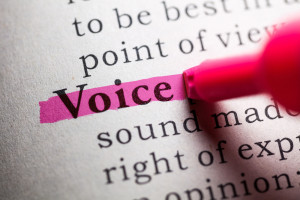Unraveling the Mystery of Your Unique Writing Voice (in Fewer Than 5 Minutes)
Based on the questions I hear wherever I speak, beginning writers agonize as much over this issue as anything else.
Trust me, while it’s crucial you find your voice and become distinctive, it really isn’t all that complicated.
You wouldn’t be able to tell that from the plethora of blogs, articles, and books on the subject. Google “finding your writing voice” and you’ll spend the rest of your day and night immersed in the opinions of everyone, it seems, who has ever been published.
I don’t want to be just another, um, voice among all the others, so let me take a shot at breaking this down and making it simple. I’ll do it by asking you to use your memory and your imagination and also by sharing a personally embarrassing story that I hope will make it stick.
The Surprisingly Simple 3-Step Process to Finding Your Voice
When determining what your writerly voice should sound like on the page, consider:
The coolest thing that ever happened to you
The most important person you told about it
What you sounded like
That’s as complicated as it needs to be.
Here’s how it works and how my story plays into this.
The highlight of my life was realizing that I had met the woman who would become my wife.
I could not wait to tell my best friend, who happened to work at an all-night gas station.
I sounded smitten, as interested in my story as anything I had ever said before.
I drove nearly three hours in the wee hours of the morning after leaving my beloved, pulled into the gas station, eyes alight, and made my friend drop everything else and sit before me to give me his full attention.
I sat atop a 55-gallon oil drum, then told him all about Dianna, and I mean everything. What she looked like, sounded like, how she acted, how much I loved her, that he would be in the wedding—
“Wedding?” he said. “Does she know how you feel?”
“She will soon enough,” I said, and I plunged on. For two hours I rhapsodized about a woman with whom I had spent not much more time than that. (We have been married 44 years now.)
The embarrassing part? I was wholly unaware, until I climbed down from that drum, that I had been sitting the whole time in a quarter inch of motor oil. It had soaked through my pants and down my legs. (It felt pretty good actually.)
When I arrived home at dawn, my mother took one look at me and said, “You’re in love.”
To my point:
You have a story idea, a novel. How do you go about telling it, writing it? What is your voice to sound like?
Imagine yourself sitting your best friend down and demanding their full attention, insisting, “Listen, have I got something to tell you…”
What comes next is your voice. Your writing should sound like you at your most engaged.
Writing first-person from the standpoint of your protagonist? Imagine them, sitting with their best friend, demanding their full attention…
If you don’t know your protagonist well enough to do that yet, you have more work to do.
BONUS: I’ve created a guide to help get you started on this exercise. For best results, print this document and fill it out by hand. You can click here or on the image below to download it for free: 
What have you discovered about your writing voice? Tell me in the comments below.
The post Unraveling the Mystery of Your Unique Writing Voice (in Fewer Than 5 Minutes) appeared first on Jerry Jenkins Writers Guild.



